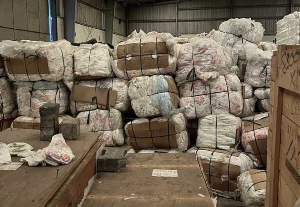The Food and Drugs Authority (FDA) has recently undertaken significant work cracking down on fake, unregistered diapers imported into the Ghanaian market. These counterfeit diapers pose serious health and environmental risks. It seems that a group of importers, intent on flouting Ghana's laws, are importing these products to make quick profits at the expense of public health.
The pharmaceutical and food industry is highly regulated because, without regulation, it could lead to significant harm to public and environmental health for the profit of a few unscrupulous businesspeople.
In the case of diapers, the unregistered ones are cheaper, and their importers easily deceive the unsuspecting public into purchasing these counterfeit products, unaware of the potential health implications. Diapers that lack an expiry date, country of origin, or a list of product components are prevalent in the market. Many of these imported diapers, banned in their countries of origin, are illegally sold in Ghana.
The increase in skin diseases and infections among infants and adult diaper users has been strongly linked to these counterfeit imported diapers. These unregistered diapers are of poor quality, unhygienically packaged, often concealed in bales of used clothing for illicit distribution, and typically lack any labeling information. They contain untested dyes, irritants, and toxins, making them unsanitary and particularly harmful to infant health, especially for baby girls who may be exposed to germs. Authorities, therefore, caution the public to purchase and use only FDA-approved and registered baby diapers to ensure public health.
Moreover, the importers of these substandard products evade taxes by bypassing the Ghana Revenue Authority, depriving the government of much-needed tax revenue.
Despite their blatant disregard for Ghanaian law, these importers have saturated the market with their products, from cities to towns and villages. Many mothers, unaware that the source of their children's skin conditions is the counterfeit diapers on the market, are seeking medical help.
It is, therefore, the FDA's legal duty to enforce the law and protect these innocent families and their children.
However, in fulfilling their duties, the FDA has faced significant opposition from the group of fake diaper importers. These individuals, believing themselves above the law, have attacked the FDA, which has been operating with impunity until the FDA asserted its authority in the interest of public health.
The FDA has shown bravery in upholding what is right, particularly concerning unapproved imported diapers, to protect public health. It's no surprise that their efforts have been acknowledged and lauded by many, including the Pharmaceutical Society of Ghana, which praised the FDA for its commitment to public health and safety.
In 2020, the World Health Organization (WHO) recognized the FDA's diligent work by ranking Ghana's FDA at Maturity Level 3 for its medicine regulatory system, which ensures the safety, quality, and efficacy of all medical products imported, manufactured, or distributed in the country.
Clearly, Ghana's FDA is on the correct path regarding the issue of counterfeit imported diapers, and no orchestrated attacks on the CEO or the organization should deter them from their enforcement duties.
The Ghana Revenue Authority is also expected to take a keen interest in this matter due to the tax revenue implications stemming from the illegal importation of diapers without FDA approval.
The Economic and Organized Crimes Office and the police CID must continue to support the FDA in its law enforcement efforts and protect public health, undeterred by the group of illegal importers currently operating with impunity.
Opinions of Monday, 29 April 2024
Columnist: Courage Alormasor















